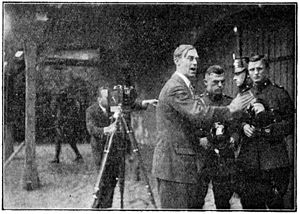Walter Ruttmann facts for kids
Quick facts for kids
Walter Ruttmann
|
|
|---|---|

Walter Ruttman at recording Berlin-Movie, 1928
|
|
| Born | 28 December 1887 Frankfurt am Main, Germany
|
| Died | 15 July 1941 (aged 53) Berlin, Germany
|
| Occupation | Film director |
| Years active | 1921–1941 |
|
Notable work
|
Berlin: Die Sinfonie der Großstadt |
Walter Ruttmann (born December 28, 1887 – died July 15, 1941) was a German film director and cinematographer. He was a very important artist in making experimental films. These films often used abstract art, meaning they showed shapes and colors instead of real things.
Ruttmann worked alongside other famous experimental filmmakers like Hans Richter and Oskar Fischinger. He is most famous for his 1927 silent film called Berlin: Symphony of a Metropolis. This film was like a documentary about a city. He also created an amazing audio piece called Wochenende (Weekend) in 1930. This work was very important for the development of audio plays.
Contents
Walter Ruttmann's Early Life and Art
Walter Ruttmann was born in Frankfurt am Main, Germany. His father was a wealthy merchant. After finishing high school in 1905, Walter started studying architecture in Zürich in 1907.
In 1909, Ruttmann began painting in Munich. There, he became friends with famous artists like Paul Klee and Lyonel Feininger. He also painted in Marburg.
How Ruttmann Started Making Films
Walter Ruttmann joined the army in 1913. He served in World War I on the Eastern Front. After spending time in a hospital in 1917, he started making films.
Ruttmann had enough money to work on his own. He did not need to work for the big German film studios. In June 1920, he started his own company called Ruttmann-Film S.R.O. in Munich. He also invented and patented a special table for animation.
Pioneering Abstract and Animated Films
Ruttmann's first films were the first fully animated German cartoons. They were also some of the first abstract animated films.
His film Lichtspiel: Opus I was made between 1919 and 1921. It was shown for the first time on April 27, 1921, in Berlin. This film is known as the "oldest fully abstract motion picture still existing." It uses only moving geometric shapes and does not show any real-life images.
Opus I and Opus II were experiments with new ways to make films. These early abstract films influenced other artists, like Oskar Fischinger. Ruttmann and other artists of his time helped create new techniques for filmmaking.
In 1926, he worked on Der Aufsteig. This was an experimental film that advertised a trade fair in Düsseldorf.
Special Effects and Sound Experiments
In 1926, Ruttmann used a special machine from Oskar Fischinger. This machine helped him create special effects for The Adventures of Prince Achmed. This was an animated fairy tale film made by Lotte Reiniger. Ruttmann helped create the moving backgrounds and magical scenes in the film.
Ruttmann was a leader in both new art and music. His early abstract films were praised at a festival in 1929. He also worked with Erwin Piscator on the film Melody of the World (1929).
However, he is best known for Berlin: Die Sinfonie der Großstadt (Berlin: Symphony of a Metropolis), made in 1927. This film shows a day in the life of the city of Berlin.
His work Weekend (Wochenende) was made for Berlin Radio Hour in 1928. It was presented on June 13, 1930. This was a very early example of musique concrète. This type of music uses recorded sounds from real life. Ruttmann recorded sounds from the streets of Berlin using a camera, but without images. This was before magnetic tape was invented. Hans Richter called it "a symphony of sound, speech-fragments, and silence woven into a poem."
Later Life and Legacy
Walter Ruttmann believed in peace. He traveled to Moscow in 1928 and 1929. During the time of the Nazi government, he was replaced as director of a documentary. This film later became Triumph of the Will (1935). Some people thought Ruttmann's film style was too influenced by Soviet ideas.
Walter Ruttmann died in Berlin on July 15, 1941. He passed away due to a blood clot after a leg surgery.
Ruttmann's Influence in Culture
Parts of Ruttmann's experimental films Lichtspiel: Opus II (1923) and Lichtspiel: Opus IV (1925) are used in the opening credits of the German TV show Babylon Berlin. New soundtracks have been suggested for faster versions of Lichtspiel: Opus I and Opus IV in 2023.
Select Filmography
- Lichtspiel: Opus I (1920)
- Der Sieger (1922)
- Das Wunder (1922)
- Lichtspiel: Opus II (1922)
- Lichtspiel: Opus III (1924, with Lore Leudesdorff)
- Lichtspiel: Opus IV (1925, with Lore Leudesdorff)
- Das wiedergefundene Paradies (1925)
- Der Aufstieg (1926)
- Spiel der Wellen (1926)
- Dort wo der Rhein... (1927)
- Berlin: Die Sinfonie der Großstadt (1927)
- Melody of the World (Melodie der Welt) (1929)
- Wochenende (1930) [an experimental film with sound only, no image]
- Feind im Blut (1931)
- In der Nacht (1931)
- Steel (1933)
- Blut und Boden - Grundlagen zum neuen Reich
- Altgermanische Bauernkultur (1934)
- Metall des Himmels (1935)
- Schiff in Not (1936)
- Mannesmann (1937)
- Henkel, ein deutsches Werk in seiner Arbeit (1938)
- Waffenkammern Deutschlands (1940)
- Deutsche Panzer (1940)
- Krebs (1941)
See also
 In Spanish: Walter Ruttmann para niños
In Spanish: Walter Ruttmann para niños
 | Jessica Watkins |
 | Robert Henry Lawrence Jr. |
 | Mae Jemison |
 | Sian Proctor |
 | Guion Bluford |

